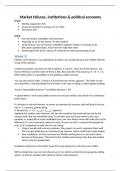Market failures, institutions & political economy
Grade
Weekly assignment 15%
Group presentation in groups of 2 or 3 20%
Final exam 65%
Setup
Voor de lecture: wekelijkse stof doorlezen
Maandag 13.15-15.00: lecture niet verplicht
Na de lecture, voor de tutorial: wekelijkse opdracht maken in remindo en de
discussion question doen, maar hierover volgt later meer
Donderdag 09.00-10.45: tutorial verplicht om allemaal aanwezig te zijn
Week 8
Median voter theorem: if you distribute all voters, you would end up in the middle with the
result of the election.
Condorcet paradox: say there are three options, A, B and C. There are three persons, and
their preferences and the order of them is ABC, BCA and CAB. This would say A > B > C > A.
With voting, there is a possibility of not getting a stable outcome.
You can also vote in order, so first A vs B and then the winner against C. The order can be
very important. Choosing things like the order or the way of voting is called agenda settings.
Arrow’s impossibility theorem = possibility theorem = AIT
In spatial theory, voters and political actors are not just ranked, but placed on a continuous
policy space.
If a dictator is only self-interest, he wants to maximize his revenue, with will lead to the tax
rate t = 1 / gamma, gamma being
In democracy, t = ((1 - ymedian) / yaverage) / gamma)
Applying the median voter theorem, the tax rate would be the preferred tax rate by the
median voter. But not everybody votes. It can take costs but there mainly is the voter
paradox: as, especially in a two-candidates race, one vote almost never will make the crucial
difference, it’s not economical rational to vote. So you can call it a surprise that people do
vote. So it’s important to look who are not voting:
Fringes: people with extreme opinions, they expect no one to represent them well.
This can give politicians an incentive to be extreme, which could lead to polarization.
Poor candidates, as they may have less flexible working hours or too much stress
because of being poor. This leads to the median voter being richer than the median
citizen, which is problematic.
Euclidean preferences: the further away from your preference, the lower your utility.
With a closed vote, you can only choose yes or no, which can lead to strong agenda-setting
power, so that the median voter theorem doesn’t hold anymore.
,
, Week 7
In complete markets, which have no transaction costs, it doesn’t matter to whom property
rights belong, but this is often not the case.
Nog te lezen: hoofdstuk 9 vanaf pagina 2





